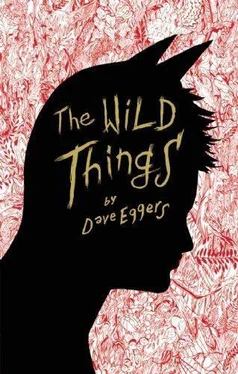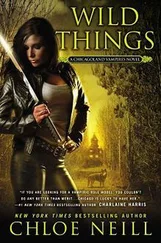Dave Eggers - The Wild Things
Здесь есть возможность читать онлайн «Dave Eggers - The Wild Things» весь текст электронной книги совершенно бесплатно (целиком полную версию без сокращений). В некоторых случаях можно слушать аудио, скачать через торрент в формате fb2 и присутствует краткое содержание. Год выпуска: 2009, Издательство: McSweeney's, Жанр: Современная проза, на английском языке. Описание произведения, (предисловие) а так же отзывы посетителей доступны на портале библиотеки ЛибКат.
- Название:The Wild Things
- Автор:
- Издательство:McSweeney's
- Жанр:
- Год:2009
- ISBN:нет данных
- Рейтинг книги:4 / 5. Голосов: 1
-
Избранное:Добавить в избранное
- Отзывы:
-
Ваша оценка:
- 80
- 1
- 2
- 3
- 4
- 5
The Wild Things: краткое содержание, описание и аннотация
Предлагаем к чтению аннотацию, описание, краткое содержание или предисловие (зависит от того, что написал сам автор книги «The Wild Things»). Если вы не нашли необходимую информацию о книге — напишите в комментариях, мы постараемся отыскать её.
The Wild Things — читать онлайн бесплатно полную книгу (весь текст) целиком
Ниже представлен текст книги, разбитый по страницам. Система сохранения места последней прочитанной страницы, позволяет с удобством читать онлайн бесплатно книгу «The Wild Things», без необходимости каждый раз заново искать на чём Вы остановились. Поставьте закладку, и сможете в любой момент перейти на страницу, на которой закончили чтение.
Интервал:
Закладка:
Dave Eggers
The Wild Things
For Maurice Sendak, an unspeakably brave and beautiful man
CHAPTER I
Matching Stumpy pant for pant, Max chased his cloud-white dog through the upstairs hallway, down the wooden stairs, and into the cold open foyer. Max and Stumpy did this often, running and wrestling through the house, though Max’s mother and sister, the two other occupants of the home, didn’t appreciate the volume and violence of the game. Max’s dad lived in the city and phoned on Wednesdays and Sundays but sometimes did not.
Max lunged toward Stumpy, missed, barreled into the front door, and knocked the doorknob-basket off. The doorknob-basket was a small wicker vessel that Max thought was stupid but Max’s mom insisted on having on the front doorknob for good luck. The main thing the basket was good for was getting knocked off, and landing on the floor, where it was often stepped on. So Max knocked the basket off, and then Stumpy stepped on it, putting his foot through the bottom with an unfortunate wicker-ripping sound. Max was worried for a second, but then his worry was eclipsed by the sight of Stumpy trying to walk around the house with a basket stuck to his foot. Max laughed and laughed. Any reasonable person would see the humor in it.
“Are you going to be a freak all day?” Claire asked, suddenly standing over Max. “You’ve only been home for ten minutes.”
His sister Claire was fourteen, almost fifteen, and was no longer interested in Max, not on a consistent basis at least. Claire was a freshman now and the things they always liked to do together — including Wolf and Master, a game Max still thought worthy — were no longer so appealing to her. She had adopted a tone of perpetual dissatisfaction and annoyance with everything Max did, and with most things that existed in the world.
Max didn’t answer Claire’s question; any response would be problematic. If he said “No,” then it would imply he had been acting freakish, and if he said “Yes,” it would mean that not only had he been a freak, and he was admitting it, but that he intended to continue being a freak.
“You better make yourself scarce,” Claire said, repeating one of their dad’s favorite expressions. “I’m having people over.”
If Claire had been thinking clearly, she would have known that to tell Max to become scarce would only make him want to be more prominent , and to tell him that she was having people over would only make him more committed to being present. “Is Meika coming?” he asked. Meika was his favorite among Claire’s friends, the rest of whom were imbeciles. Meika paid attention to him, actually talked to him, asked him questions, had one time even come into his room to play Legos and admire the wolf suit he kept on his closet door. She had not forgotten what was fun.
“None of your business,” Claire said. “Just leave us alone, okay? Don’t ask them to play with your blocks or whatever lame crap you want them to do.”
Max knew that watching and annoying Claire and her friends would be better with someone else, so he went outside, got on his bike, and rode down the street to Clay’s. Clay was a new kid; he lived in one of the just-built houses down the street. And though he was pale and his head too big, Max was giving him a chance.
Max rode down the sidewalk serpentine-style, his head full of possibilities for what he and Clay might do with or, barring that, to Claire’s friends. It was December and the snow, dry and powdery just a few days earlier, was now melting, leaving slush on the roads and sidewalks, a patchy cover on the lawns.
Something was happening in Max’s neighborhood. The old houses were being taken down, and in their place, new, bigger and louder houses were rising. There were fourteen homes on his block, and in the last two years, six of them, all of them smallish, one-story ranches, had been leveled. In each case the same thing had happened: the owners had left or had died of old age, and the new owners had decided that they liked the location of the house, but wanted a far larger one where it stood. It brought to the neighborhood the constant sound of construction, and, thankfully for Max, a near-endless supply of castoff materials — nails, wood, wire, insulation, and tile. With it all he’d been assembling a sort-of home of his own, in a tree, in the woods by the lake.
Max pedaled up, dropped his bike, and knocked on the door of Clay Mahoney. He bent down to tie his shoes, and as he finished the second knot on his left shoe, the door flew open.
“Max?” Clay’s mother stood over him, wearing tight black pants and a small white T-shirt — TODAY! YES! it said — over a black lycra top; she was dressed like a competitive downhill skier. Behind her, an exercise video had been paused on the television. On the screen, three muscular women were reaching upward and rightward, desperate and grimacing, for something far beyond the frame.
“Is Clay home?” Max asked, standing up.
“No, I’m sorry Max, he’s not.”
She was holding a large, silver canister with a black handle — some sort of coffee mug — and while taking a sip from it, she looked around the front porch.
“Are you here alone?” she asked.
Max thought a second about this question, looking for a second meaning. Of course he was here alone.
“Yup,” he said.
She had a face, Max had noticed, that always seemed surprised. Her posture and voice aimed at knowingness, but her eyes said Really? What? How is that possible?
“How’d you get here?” she asked.
Another odd question. Max’s bike was lying no more than four feet behind him, in plain sight. Could she not see it?
“I rode,” he said, jerking a thumb over his shoulder.
“Alone?” she asked.
“Yup,” he said. This lady , Max thought.
“Alone?” she repeated. Her eyes had gone wide. Poor Clay. His mom was nuts. Max knew he should be careful about what he might say to a crazy person. Didn’t crazy people need to be treated with great care? He decided to be very polite.
“Yes, Mrs. Mahoney. I … am … alone.” He said the words slowly, carefully, maintaining eye contact all the while.
“Your parents let you ride around on your own? In December? Without a helmet?”
This lady definitely had a problem grasping the obvious. It was obvious that Max was alone, and obvious that he had ridden his bike. And there was nothing on his head, so why ask about the helmet? She was delusional on top of it all. Or maybe functionally blind?
“Yes, Mrs. Mahoney. I don’t need a helmet. I live just down the block. I rode here on the sidewalk.”
He pointed down the street to his own house, which was visible from her door. Mrs. Mahoney put her hand on her forehead and squinted, like a castaway searching the horizon for a rescue vessel. She dropped her hand, returned her eyes to Max, and sighed.
“Well, Clay is at his quilting class,” she said. Max didn’t know what a quilting class was, but it sounded a lot less fun than making icicle-spears and throwing them at birds, which had been on Max’s mind.
“Well, okay. Thanks, Mrs. Mahoney. Tell him I came by,” he said. He waved goodbye to Clay’s crazy mom, turned, and got on his bike. He heard the Mahoney’s door shut as he coasted away. But when he turned onto the sidewalk and toward his house, he found Mrs. Mahoney next to him, striding purposefully, still holding her silver drink canister.
“I can’t let you go alone,” she said, striding briskly alongside him.
“Thanks, Mrs. Mahoney, but I ride alone every day,” he said, pedaling cautiously and again maintaining steady eye contact. Her weirdness had tripled and his heartbeat had doubled.
Читать дальшеИнтервал:
Закладка:
Похожие книги на «The Wild Things»
Представляем Вашему вниманию похожие книги на «The Wild Things» списком для выбора. Мы отобрали схожую по названию и смыслу литературу в надежде предоставить читателям больше вариантов отыскать новые, интересные, ещё непрочитанные произведения.
Обсуждение, отзывы о книге «The Wild Things» и просто собственные мнения читателей. Оставьте ваши комментарии, напишите, что Вы думаете о произведении, его смысле или главных героях. Укажите что конкретно понравилось, а что нет, и почему Вы так считаете.












